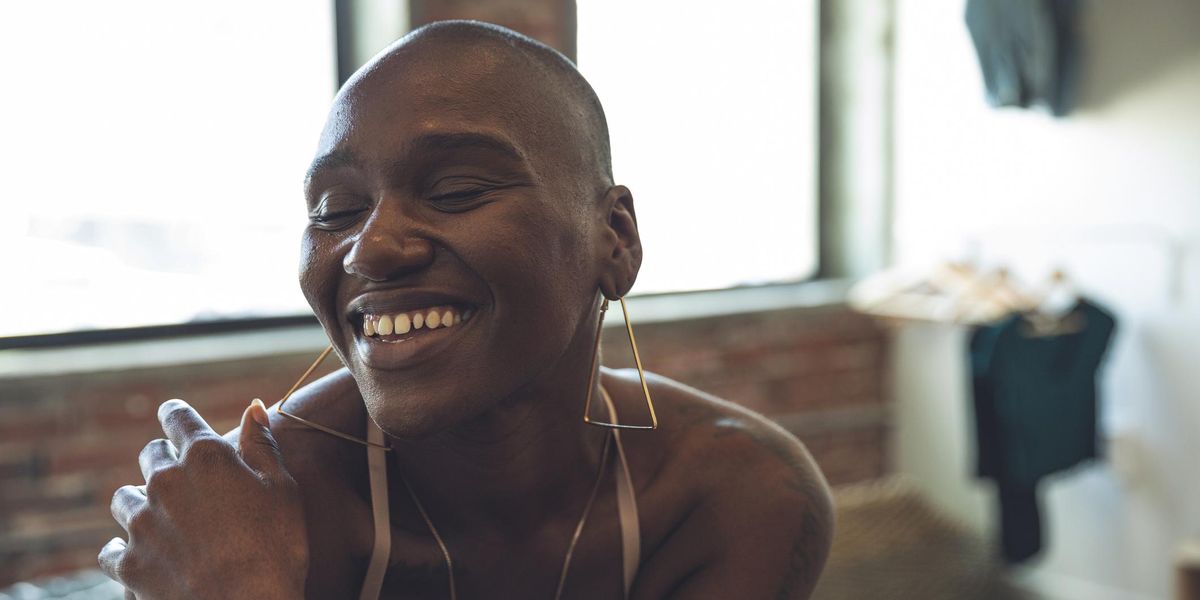
These Beauties Revealed Their Big Chop Results & Now We’re Ready To Trim Our Tresses, Too
Times like this, I wish hair salons provided Life Alert because my curls have fallen and they can't get up.
After months of relentless heat and chemical processing, my tresses are tired and seem to have given up the good fight. With all of this newfound time on my hands, I'm just about ready to press the reset button on my curl pattern and this big chop-inspired thread on Twitter isn't making my scissor envy any better.
In a thread created by YouTuber, Chandler Alysse, hundreds of women flooded Twitter with the results from their big chop and tips that keep their curls poppin' and it was absolutely everything. Chandler, who experienced hella growth since her big chop, said that implementing apple cider vinegar, rice water, Jamaican black castor oil, and products from Bella Curls have allowed her curls to return with a vengeance.
Along with Chandler, other queens dropped their tips for regrowth and maintenance after their big chop and we have all the details.
Scroll below for some of our faves!
@GoldAFrancois

"My best advice would be look into using aloe vera as a leave-in or a gel and try wearing [a] low manipulation style as much as possible while keeping it moisturized!"
@ohitsbreee

@itslanette

"I did regular flat twists and then added perm rods to the ends. That's day 3 hair in the picture too."
"At night I put my hair in little ponytails to stretch the roots, cover with my bonnet, and pick it in the morning."
@tonayalorennexo

@sorpeguero

"Moisturize! Make sure your scalp is always clean. LOTS of hair masks, lots of scalp massages. Sulfate-free shampoo. Satin pillowcase/bonnet, hydrate hydrate hydrate! Protective styles but still moisturizing. I figured out what worked for me, it took years."
@loveleighla

@karlamary440

@maurachanz

Featured image by Pinterest.
- Sanaa Lathan Natural Hair Growth - xoNecole: Women's Interest ... ›
- Influencer Nia The Light Discusses Big Chop - xoNecole: Women's ... ›
- Yvonne Orji Big Chop - xoNecole: Women's Interest, Love, Wellness ... ›
- My Decision To Big Chop Changed The Game For My Love Life ... ›
- Questions To Ask Before Getting The Big Chop - xoNecole: Women's Interest, Love, Wellness, Beauty ›
Taylor "Pretty" Honore is a spiritually centered and equally provocative rapper from Baton Rouge, Louisiana with a love for people and storytelling. You can probably find me planting herbs in your local community garden, blasting "Back That Thang Up" from my mini speaker. Let's get to know each other: @prettyhonore.
This article is sponsored by Hulu.
UnPrisonedhas returned for its highly anticipated second season, delving deeper into the complex dynamics of the Alexander family.
The series premiere comes a year after its debut season garnered rave reviews from fans and critics and earned record-breaking ratings for Hulu's Onyx Collective brand. UnPrisoned's success can be attributed to its raw, relatable themes and comedic appeal.
Inspired by creator Tracy McMillan's life, the show follows Paige (Kerry Washington), a therapist and single mother whose life takes an unexpected turn when her father, Edwin (Delroy Lindo) --who was released from prison-- moves in with her and her teenage son, Finn (Faly Rakotohavana).
Throughout UnPrisoned's first season, viewers witnessed how Edwin's incarceration deeply affected Paige's life and relationships. In the series, Paige unpacks her trauma through interactions with her inner child and her online followers. Meanwhile, Edwin is overcoming specific struggles with his own past that led to his life of crime, including a dysfunctional upbringing and his mother's arrest. As the Alexanders attempt to reconcile, new challenges arise.
This new season promises to further explore their unconventional family dynamic. Here are several compelling reasons why season two of UnPrisoned should be on everyone's watchlist.
The Alexander Family Life Is Still In Shambles
UnPrisoned's second season resumes where the series left off, with Paige grappling with the fallout from her troubled therapy practice and Edwin navigating life independently after moving out. Meanwhile, Finn faces his own challenges. The teenager is battling anxiety and seeking information about his father—a topic Paige avoids discussing.
The Alexander Family Are Attending Therapy To Resolve Their Underlying Issues
Amid the chaos in their lives, the Alexander family decides to mend their bond by confronting their past traumas. They seek professional help and attend therapy sessions with a “family radical healing coach,” played by John Stamos, a new cast member. This collective effort aims to unravel the complexities of their shared history and strengthen their relationships.
The process of unraveling each character's internal conflicts and their potential impact on future relationships may clash with Paige's textbook therapy approach. While Paige is used to being in the therapist's seat in both career and family, this forces her into the unfamiliar role of a patient during therapy sessions. This shift would compel her to look in the mirror and try a radically different approach.
The Alexander Family Learned A Big Lesson During A Therapy Session
In therapy, the Alexanders are tasked with addressing their individual traumas to salvage their remaining relationships. One of the family therapist’s eccentric suggestions was an exercise involving a family wrestling match. During this session, Paige faces tough questions about her refusal to share information about Finn's father.
While it's unclear whether this scene is reality or fantasy, the image of the family duking it out in the ring certainly makes for hilarious yet compelling television.
Paige Tries Dating Again Following Failed Relationships
Amid her life's chaos, Paige decides to step back into the dating field. However, her many attempts have left her with mixed results. The dating apps have turned out to be a fail, and an outing with her ex Mal (Marque Richardson), who is also her father's parole officer, doesn’t go quite as expected after he brings an unexpected guest – his new girlfriend.
The situation takes an awkward turn when Mal's new partner learns why the former couple split, partly due to Paige's self-sabotage.
UnPrisoned Is A Perfect Balance Of Comedy And Drama
As a dramedy, UnPrisoned takes a comedic approach to its heavy subjects. The show takes us on a ride with Paige's dating misadventures and navigating a friendship with her ex.
Other lighthearted moments include Edwin's attempts at CPR based on online videos and, of course, the antics of the Alexander family's unconventional new healing coach.
The second season of UnPrisoned is now available on Hulu.
UnPrisoned | Season 2 Trailer | Hulu
Feature image courtesy
5 Things I Wish I Knew Before Buying My First Home That Can Save You Money
The day I closed on my first home was met with mixed emotions. On one hand, I was excited to take a big step in my life and towards my financial goals. I had found the perfect investment property that would serve as my primary residence for at least the next year—a cute little bungalow in an area that was sure to significantly increase my property value in a few years.
Yet, there was a bit of anxiety as I walked through the door. Was I making the right decision? Would buying this home be a blessing and not a curse? Would I be cleared to close, or would one final run of my credit report show something that would stop me from being able to purchase the home?
I swallowed my fears, said a little prayer, and proceeded with the process of signing on the dotted line. The home was officially mine, and getting the keys to my new abode brought a wave of pride. But as I would later discover while making my new house a home, there were many things I wished I had considered before buying my first home, and even more so now that I’m in my second one.
“Purchasing a home is a beautiful experience,” shares Lauren Cobb, realtor at Keller Williams Peachtree Road in Atlanta, Georgia. “I’ve seen real estate change the lives of many clients, including myself, by buying at the right time and within budget. It’s also a unique experience for each buyer. No buyer has the same experience as their family or peers.”
With that in mind, here are five tips I wish I'd known before buying my first home.
1.The underwriting process is thorough; they will examine everything.
The underwriting process for my first home went relatively smoothly. I had just gotten out of debt and had a great credit score. I’d been at my job for four years, so I could show consistent income. I didn’t have any student loans or car payments to consider, and I didn’t anticipate taking on any new debt. I was glad I had worked hard to get my finances in order before going into underwriting. But it’s not always that easy, and here’s why.
Once you get pre-approved, you should generally expect your lender to ask for one month of pay stubs, two months of bank statements, and two years of W-2s to start the underwriting process. This can vary depending on the type of loan you’re going for, where your income comes from (W-2, your own business, etc.), and the industry you work in. During this time, you shouldn’t take on any new credit as they will compare your original credit report to the one pulled right before closing.
In HGTV host Egypt Sherrod’s book Keep Calm, It’s Just Real Estate: Your No-Stress Guide to Buying a Home, she shares that “banks approve you for your mortgage based upon your credit score and savings at the time of approval. Your approval is contingent upon those items remaining the same through closing.” In other words, any new additional debts will impact your loan from closing. Even something as simple as using Afterpay or Klarna will be treated as an installment loan, and you will be asked to provide documentation for that transaction.
I recommend not making any major purchases before you close on your home as it can determine if you get a final approval to close and the interest rate. This will make your process much smoother, and you will be more likely to see the sweet words “Please see your attached final CD,” letting you know that you’ve successfully cleared underwriting and are approved to close.
2.Property taxes and insurance can significantly increase your monthly payments.

Tetra Images/Getty Images
One of the main reasons that many of us buy a home is that we’re hoping to escape the neverending rent increase that we’re presented with at the end of our lease. While a fixed-rate mortgage offers predictable monthly payments, what’s not often shared is how property tax and insurance increases can impact your mortgage payments.
I admittedly was caught by surprise when last year my mortgage went up by $400 because the county assessed my property value to be higher than years prior. If you purchase a home in an area where homes increase in value at a faster rate than others, you may find that the increased equity that you’re celebrating comes at a price, and depending on your budget that price may make or break whether or not you can still afford the home.
One way to combat rising property costs is to look into your state’s homestead exemption laws. According to the National Association of Realtors, the homestead exemption, at its core, “reduces the taxable value of a homeowner's primary residence, meaning a portion of the home value will not be taxed. This reduction results in lower property tax bills.” This exemption only applies to your primary residence and the requirements vary from state to state, but if you do qualify, it can save you from extreme hikes in property taxes and thousands of dollars over time.
3.Your mortgage impacts your debt-to-income ratio, affecting your ability to qualify for other credit.
In an ideal world, your mortgage would be less than the cost of rent you were proverbially shaking your fist over. But in reality, that’s not always the case. Due to high interest rates, the increasing cost of homeownership, and the type of home you’re looking for, you may find yourself paying more than you were before in rent (but hey, at least it’s going toward something that could potentially be an asset one day, right? Right?!).
Your lender may approve you for a higher monthly payment, but it’s not until you move into your lovely abode and attempt to apply for new credit or even refinance months or years down the road that you learn that with a higher monthly payment, you’ve also increased your debt-to-income (DTI) ratio. This is a number that lenders use to determine if you’re a good candidate for credit approval, and even a couple of hundred dollars can push you beyond the DTI they’re comfortable with approving.
If your income is increasing and you’re not taking on other debt, this may not be an issue for you. But as we all know, life happens, so it’s always good to be prepared and to plan accordingly in case you find yourself in need of credit in the future.
4.Ask the seller for a credit to help lower your out-of-pocket costs.

Westend61/Getty Image
One thing that held me back from buying sooner was assuming that I would need a lot more cash available for closing. While you should always be prepared to pay the estimated closing costs shared with you by the lender, it’s good to know that the final amount may be higher or lower than what is on the final Closing Disclosure (CD). One way to potentially lower that amount is to negotiate a seller credit.
A seller credit is money that the seller gives the buyer at closing, usually lowering your out-of-pocket closing costs. The main way to negotiate this is to use your inspection report to get an estimate of the cost of any repairs that the report highlights. For example, when I purchased my home, I knew from the inspection report that the HVAC was 18 years old and would need replacement soon. I reached out to a few different HVAC companies to get estimates on the cost of replacing the unit and used the highest estimate to negotiate with the seller to cover the cost of replacing the HVAC. I did the same with a few other needed repairs, and the seller agreed to contribute a $10,000 seller credit to cover these costs. This reduced my closing costs from $24,456 to $14,456.
Sometimes, the seller will even offer a credit upfront to incentivize the buyer to go under contract, especially if the home has been on the market for some time and/or they are looking to sell quickly. While these deals aren’t always easy to find, nor are sellers required to provide them, it’s good to know that it’s a possible option in case you’re looking for a way to lower your out-of-pocket costs.
5.Negotiate with the seller to buy down the interest rate.
Anyone who has been home shopping in the last couple of years can attest that current mortgage rates are high compared to rates during the pandemic, which, according to Investopedia, reached as low as 2.65% in January 2021 for 30-year, fixed-rate mortgages. Even a small increase in your mortgage rate can significantly raise your monthly payments and potentially price you out of your desired home. But there’s good news!
Similar to a seller credit, you can potentially negotiate a rate buydown with the seller. A rate buydown allows the buyer to secure a lower interest rate by having the seller pay the lender to reduce the interest rate. For example, you may have locked in a 7.5% fixed interest rate with your lender, but thanks to your realtor negotiating a buydown with the seller, they are willing to contribute enough money to lower your rate to 7%. Sellers are sometimes motivated to do this as it can often be cheaper than lowering the price of their home. A lower mortgage rate can significantly reduce your monthly payment and save you thousands of dollars over the lifetime of your mortgage.
—
Navigating the home-buying process can be overwhelming, but understanding these key factors can help you make more informed decisions and save you thousands of dollars in the long run. Keep these tips in mind to ensure a smoother, more rewarding home-buying experience.
Let’s make things inbox official! Sign up for the xoNecole newsletter for love, wellness, career, and exclusive content delivered straight to your inbox.
Featured image by Lock Stock/Getty Images











